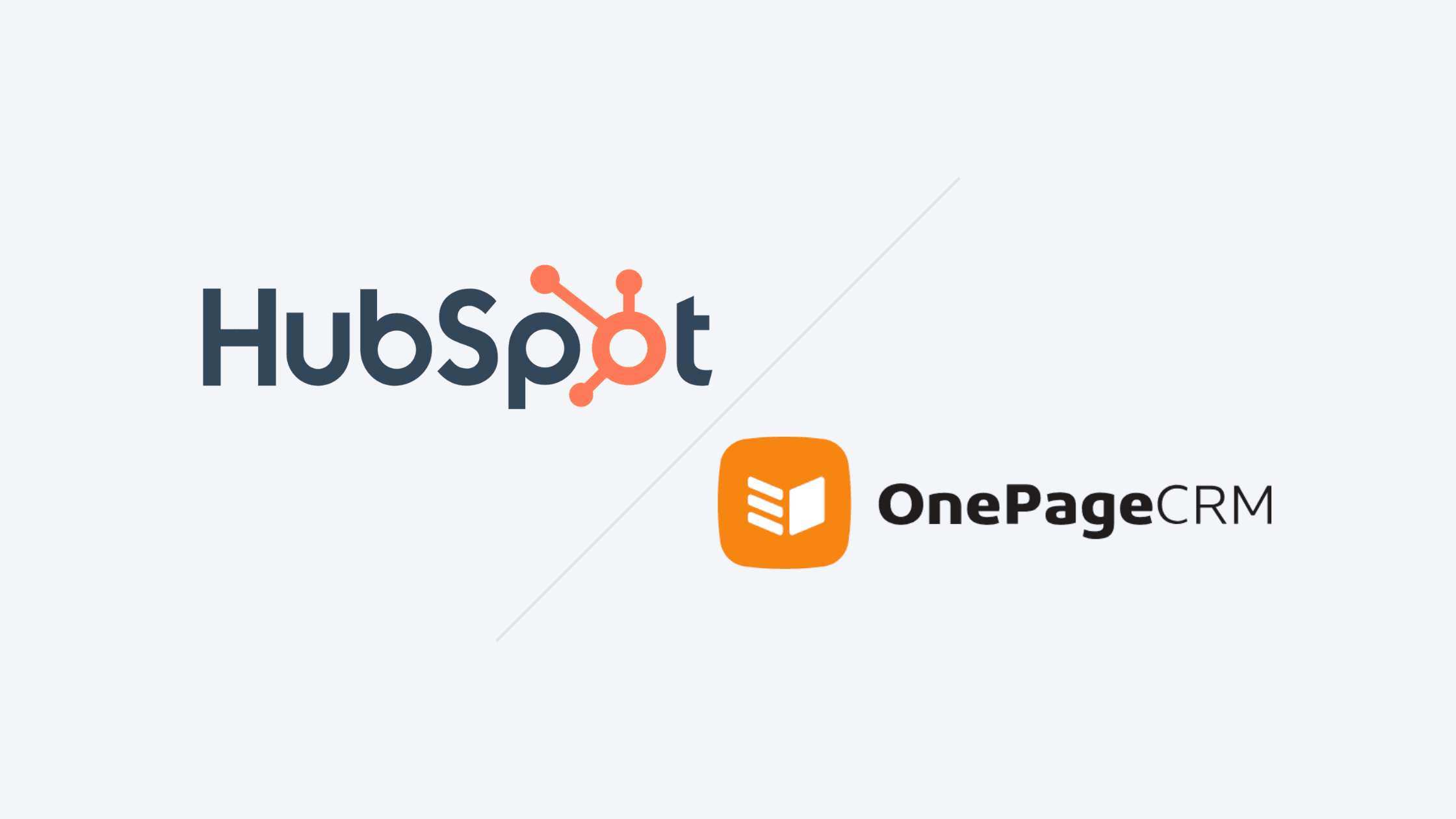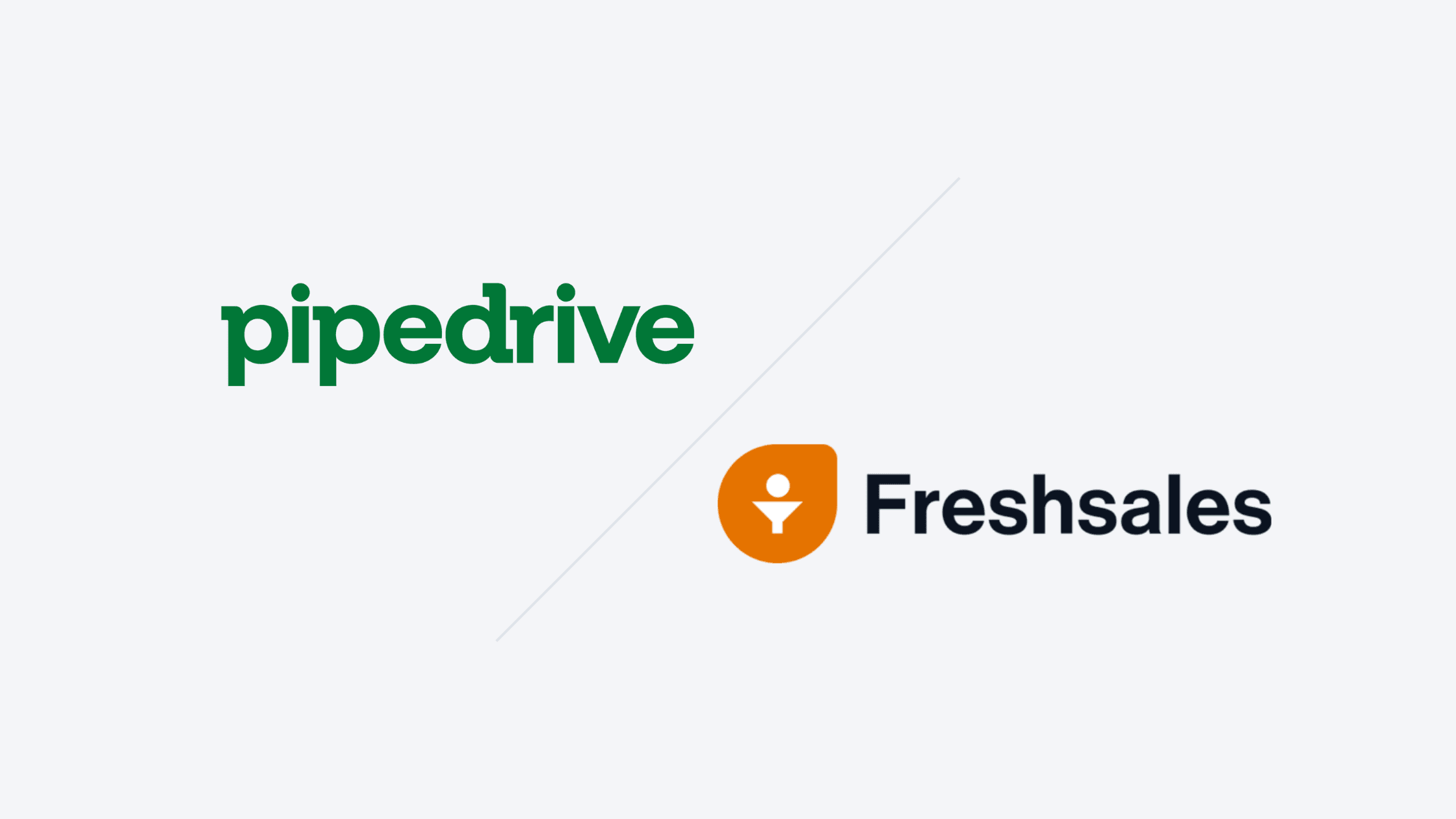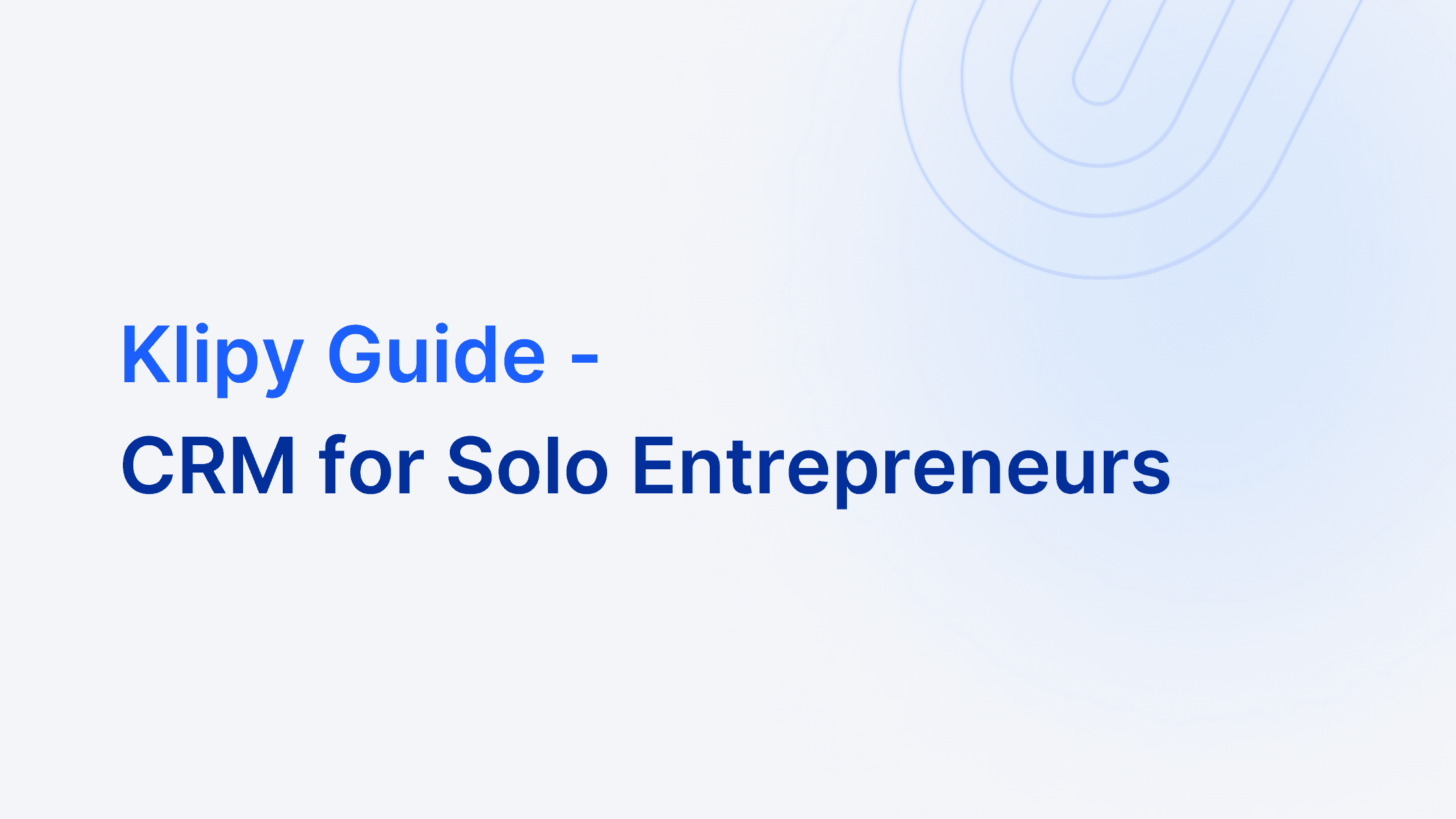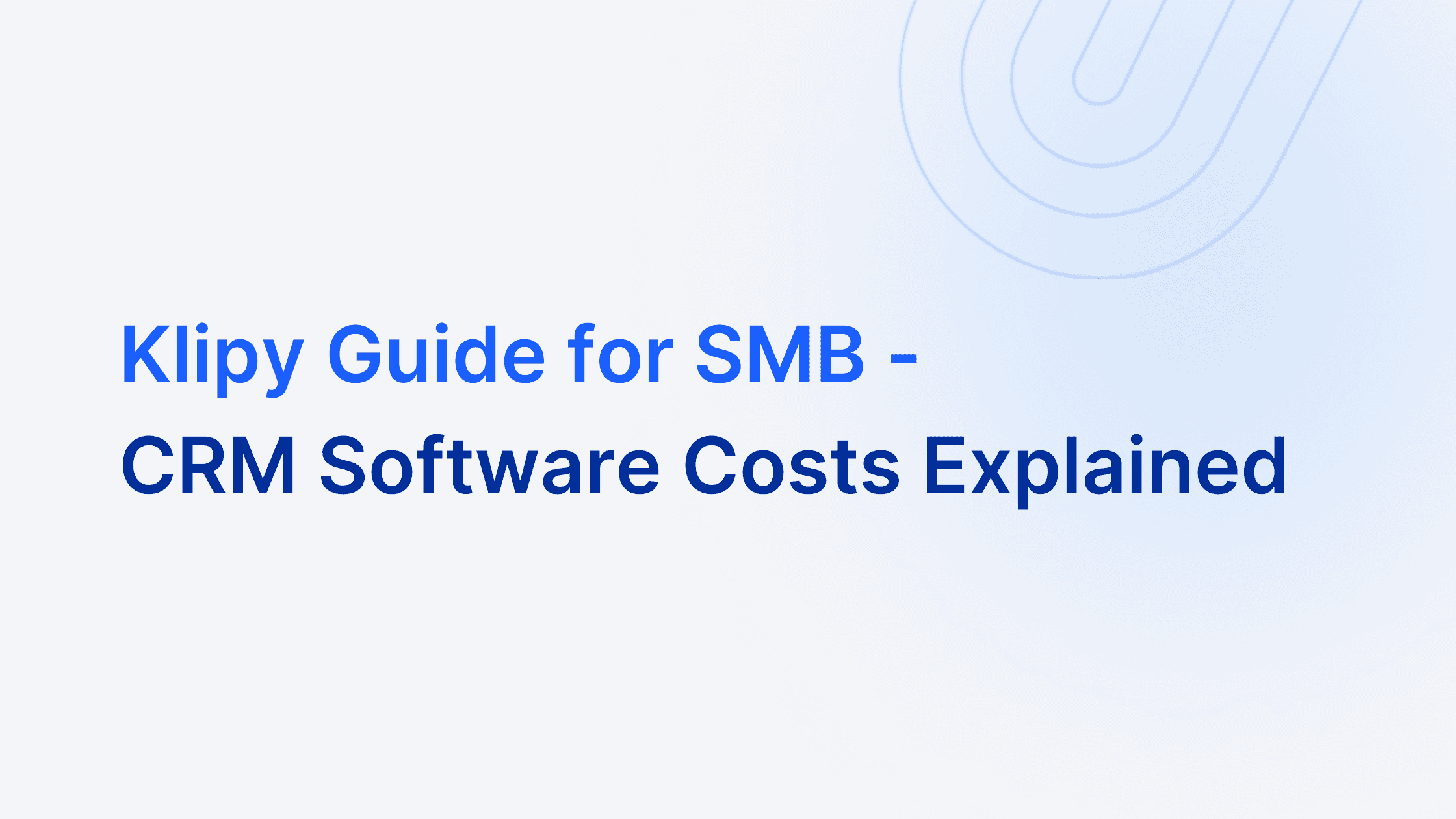Small Business
Simple CRM for Small Business: Hubspot vs. OnepageCRM
Explore top Hubspot alternatives for small businesses seeking affordable, user-friendly CRM solutions that enhance efficiency and growth such as Onepage CRM.
Simple CRM for Small Businesses: Why It Matters and How to Choose
Running a small business means juggling a lot of moving parts, and finding the right CRM to streamline those parts is crucial. Many small business owners are realizing that Pipedrive might not fit the bill. Why? It can be pricey, and its features might push you to upgrade sooner than you'd like.
Small businesses often need a CRM that's easy to use, budget-friendly, and packed with features that don't require a tech guru to operate. The search for a simpler, more adaptable CRM has sparked interest in alternatives that offer robust tools without the hassle.
Growing business signals more robust, standardized operations - including a CRM program.
63% of SMB leaders who use a CRM system say the number one benefit of a CRM is that it helps them provide better or faster customer service.
Online CRM software such as Onepage CRM or Hubspot for small businesses brings all customer data into one place, making it easier to understand customer behavior and tailor your marketing efforts.
There comes a moment where your business needs to migrate your client list from simple spreadsheets to a more robust, easy to visualize tool to make strategic decisions quickly. There can be 5 major signs your business needs a CRM outlined as:
You need a better way to track prospects and customers
Your prospects and customers have multiple points of contact.
You have a long or complex sales cycle.
Your goal is to grow your business.
You’re ready to leverage automation
Without a CRM, businesses often struggle with disorganized customer data, missed follow-ups, and inefficient sales processes. This is why many small business owners turn to simple yet powerful CRMs like Hubspot and One Page CRM.
When choosing the best CRM here's what small businesses should be looking for:
Affordability: Tight budgets demand CRM solutions that offer great value without hidden costs.
Usability: Intuitive interfaces and straightforward setups save time and reduce the learning curve.
Comprehensive Features: Small businesses need CRMs that handle everything from contact management to sales tracking efficiently.
Integration: Seamless connections with existing tools and workflows are key to maintaining efficiency.
Exploring alternatives can lead to finding a CRM that aligns perfectly with your business goals. Whether you're just starting or looking to scale, choosing the right CRM can make all the difference in managing relationships and driving growth.
We're comparing Hubspot and Onepage CRM to see which one works best for startups and small businesses as part of the research project to review and compare CRMs for small business owners.
This comparison will give you a clear view, helping you make the right choice for your business. Want to know which CRM could become your team's new favorite tool? Let's dive in.
Comparing CRM Features for Small Business
Hubspot Starter Platform
HubSpot CRM is a big name in the CRM world, and for good reason. It offers a free CRM with a wide range of features, including contact management, email tracking, and a sales pipeline. One of the main draws for small businesses is HubSpot’s generous free plan, which includes tools for marketing, sales, and customer service.
Key Features of HubSpot CRM:
Contact Management: A centralized database to store and manage customer details, interaction history, and deal stages.
Deal Tracking: Manage the sales pipeline by creating deals, associating them with contacts, and tracking their progress through customizable stages.
Email Integration and Tracking: Connect your email to log communications, track opens and clicks, and automate follow-ups.
Sales Automation: Automate repetitive tasks like sending emails and logging calls to streamline sales processes.
Reporting and Analytics: Generate reports and dashboards to track sales performance, forecast deals, and guide strategic decisions.
Task Management: Create, assign, and monitor tasks to keep team members organized and focused on priorities.
Marketing Automation: Tools for lead nurturing, email campaigns, and segmentation to enhance marketing efforts.
Customer Support Features: Includes ticketing systems and knowledge bases to handle customer inquiries and improve service efficiency.
Pros:
Free Tier: Offers a strong free plan supporting unlimited users and up to 1,000,000 contacts, making it accessible for small businesses.
User-Friendly Interface: Intuitive design that simplifies navigation for teams of all sizes.
Integration Capabilities: Easily integrates with various third-party apps like Salesforce and Google Workspace, expanding its functionality.
Comprehensive Features: Provides a wide range of tools for sales, marketing, and customer service, offering a unified approach to customer relationship management.
Scalability: Suitable for businesses of all sizes, with features that can grow with your business.
Cons:
Complexity for Advanced Features: While basic features are easy to use, some advanced functionalities may have a learning curve.
Cost of Upgrades: Although the free version is robust, accessing advanced features in the paid tiers can become expensive as your business expands.
Limited Customization: Some users feel that customization options, particularly in reporting and dashboards, are limited compared to other CRM platforms.
There are a lot of alternatives of Hubspot for small businesses. However, Hubspot does provide a huge advantage in terms of their coverage of different aspects of sales, marketing, support and operations.
Pricing:
Hubspot's pricing is notorious for being complicated. We suggest you to explore their pricing page thoroughly to assess if their offers fit your business circumstances.

Free Plan: Offers essential CRM features at no cost, allowing unlimited users and up to 1,000,000 contacts.
Starter Plan: Costs $45 per month for two users and includes additional features like email tracking and sales automation.
Professional Plan: Priced at $800 per month for five users, this plan offers advanced features such as custom reporting, marketing automation, and deeper analytics.
Enterprise Plan: Tailored for larger organizations, with custom pricing based on specific needs, including advanced features and support.
OnepageCRM
OnePage CRM is a cloud-based CRM that focuses on simplicity and helping small businesses stay productive, especially those with a heavy sales focus. It’s designed around a “Next Action” philosophy, prompting users to take a proactive step in closing deals and managing contacts.
Key Features of OnePage CRM:
OnePageCRM offers a variety of features designed to streamline sales processes and enhance productivity:
Next Action Feature: Each contact has a designated "Next Action," which can be a task or follow-up reminder, helping users stay organized and focused on moving deals forward.
Contact Management: Users can manage unlimited contacts, notes, and deals, with an intuitive interface that displays all client information on a single page.
Sales Automation: The platform includes sales flow automations, email tracking, and native sales quotations, which facilitate efficient sales management.
Integrations: OnePageCRM integrates with various applications such as Gmail, Outlook, Mailchimp, and Zapier, allowing users to connect with tools they already use.
Mobile Access: The CRM is accessible via mobile apps for iOS and Android, enabling users to manage their sales activities on the go.
Pros:
Ease of Use: Users consistently praise OnePageCRM for its user-friendly interface, making it accessible even for those new to CRM systems.
Affordability: With pricing starting at $10 per user per month, OnePageCRM is considered cost-effective for small businesses.
Action-Oriented Design: The focus on next actions helps users maintain momentum in their sales processes, which is beneficial for productivity
Cons:
Limited Customization: Some users find that OnePageCRM may be too simplistic for businesses with complex sales processes or those requiring advanced reporting features.
Integration Limitations: Compared to larger CRM platforms like Salesforce or HubSpot, OnePageCRM has fewer integration options, which may limit its functionality for some users.
Pricing:
OnePage CRM isn’t free, but it offers two pricing tiers depending on the size and needs of your business. It’s especially popular among startups and small sales teams that need a CRM laser-focused on boosting sales productivity.
Additionally, OnePageCRM provides a 21-day free trial, allowing potential users to explore the platform before committing.

1. Professional Plan
Cost: $15 per month (discounted to $9.95 with annual billing)
Key Features:
Unlimited Contacts, Notes, Deals
Products & Services Catalog
Full Email Sync
Bulk Email Send
Integrations, Forms, Kanban
Ideal For: Very small businesses or solo entrepreneurs looking for an entry-level CRM solution.
2. Business Plan
Cost: $29 per month (discounted to $19.95 with annual billing)
Key Features:
Everything in Professional Plan
More seats (up to 100 users)
Email Tracking
Fetch historical emails
Deal velocity
Multiple Pipelines
Ideal For: Small to medium-sized businesses that require more robust CRM functionalities.
Check details of each tier and pricing here: OnePageCRM Pricing
Comparing Hubspot vs OnePageCRM Features
These are some more detailed review of Hubspot and One Page CRM broken down to key CRM features that are important for small business owners and startup founders.
When it comes to choosing between Hubspot and OnePageCRM, it's all about the details. Let's dive into how these two CRM powerhouses compare on some key features:
User Experience and Interface Comparison
Both CRMs pride themselves on simplicity, but they approach it differently.
HubSpot has a modern, user-friendly interface, with customizable dashboards and drag-and-drop functionality for sales pipelines. However, some small businesses might find HubSpot’s wide array of features overwhelming, especially if they don’t need all of them.
OnePage CRM, true to its name, focuses on keeping things clean and uncluttered. Its interface revolves around actionable steps, making it perfect for sales teams that want to focus on closing deals without getting lost in the interface.
Sales Pipeline Management
Both CRMs offer sales pipeline tracking, but the approach differs.
HubSpot allows you to customize your sales pipeline stages, with visual representations that make it easy to track deals. You can automate tasks and notifications, but these features are more robust in the paid plans.
OnePage CRM simplifies the process, focusing on actionable steps that keep the sales process moving. Each contact is tied to a specific “next action,” which reduces the chance of missing follow-ups or letting deals fall through the cracks.
Customer Support and Resources
HubSpot has a well-developed support system, including live chat, email support, and an extensive knowledge base called the HubSpot Academy, which offers training on everything from CRM basics to marketing automation.
OnePage CRM offers email support and live chat, with helpful resources such as guides and webinars. While it’s not as extensive as HubSpot’s academy, it’s more than sufficient for its user base.
Integration and Compatibility with Other Tools
When it comes to integrations, HubSpot is the clear winner, with hundreds of integrations, including email marketing tools, social media platforms, and third-party applications like Slack, Zapier, and WordPress.
OnePage CRM offers fewer integrations but supports essential tools like Mailchimp, Google Workspace, and Zapier. While limited compared to HubSpot, it covers the basics that most small businesses need.
Automation Features
Automation is where HubSpot excels, particularly with its paid plans. You can automate everything from follow-up emails to customer segmentation, which is great for businesses that want to incorporate marketing automation into their CRM strategy.
OnePage CRM offers basic task automation, helping teams stay on top of their to-dos, but it lacks the marketing automation features found in HubSpot.
Customization and Scalability
If you’re thinking long-term, HubSpot might be the better option for scalability. It allows for extensive customization of workflows, reporting, and pipelines, making it suitable for businesses that plan to grow and expand their CRM needs.
OnePage CRM is less customizable but is perfect for businesses that want to keep things streamlined without complex setups.
Reporting and Analytics
For reporting, HubSpot provides detailed insights into sales, customer service, and marketing performance. You can generate customizable reports to track KPIs, deal stages, and team productivity.
OnePage CRM offers simpler reports that give you a snapshot of your sales pipeline and performance, ideal for teams that just need the basics.
Both CRM has its strengths, so the right choice depends on your specific needs. Whether prioritizing ease of use, automation, integration, scalability, or cost, there’s an option out there for you. For a deeper dive into CRM options suitable for small and medium businesses, including comparisons between popular alternatives like Attio vs HubSpot and Folk vs HubSpot, you can explore more insights on enhancing customer management and driving growth.
FAQs on HubSpot Alternatives
Wondering if HubSpot is still free or how much it costs for a small business? We've got you covered. Here are some frequently asked questions about HubSpot alternatives:
Is HubSpot still free?
HubSpot offers a free tools tier with limited access to basic features across all its hubs (marketing, sales, service, content, operations, and commerce). This free tier supports up to 5 users but includes HubSpot branding and significant functionality limits.
How much does HubSpot cost for small businesses?
HubSpot's Sales Hub Starter starts at $20 per month per seat. For full marketing and sales features with a larger contact list, it can cost about $1,085 per month for 10 users. This makes it less budget-friendly for small businesses needing more advanced features.
What are the best alternatives to HubSpot for small businesses?
Several affordable options are available, including Klipy, Bigin by Zoho, Pipedrive, Freshsales, Folk, Attio, and Twenty CRM. These alternatives offer various features tailored to different needs and budgets, making them great choices for small businesses. For instance, Klipy provides a user-friendly CRM solution that serves as a single source of truth for businesses, allowing users to automatically organize and enrich their contacts without the complexity of traditional software.
How long does it take to implement HubSpot?
Implementing HubSpot can be slightly complex. While easier than competitors like Salesforce, you might need a consultant to set up record fields and automations. HubSpot offers a one-time professional onboarding service for a fee of $3,000.
Which CRM is Right for Your Business?
Choosing between HubSpot and OnePage CRM depends on your specific business needs.
Pricing Comparison: Which Offers More Value for Small Businesses?
Both HubSpot and OnePage CRM have attractive pricing for small businesses.
HubSpot’s free plan is robust enough to get started, but as your business grows, you may need to invest in their paid plans, which can get pricey depending on the features you need.
OnePage CRM starts at $9.95 per user/month, which is affordable for small teams, making it a great choice for businesses looking for a low-cost, sales-focused CRM.
Conclusion
When choosing between HubSpot and OnePage CRM, it really comes down to your business’s specific needs.
If you need a comprehensive CRM that can scale with your business and offer strong marketing automation, HubSpot is the better choice. But if you’re a small business focused primarily on sales and want a straightforward, affordable option, OnePage CRM may be the best fit.
You may reference our other articles related to CRM software for small businesses:
More from the blog





